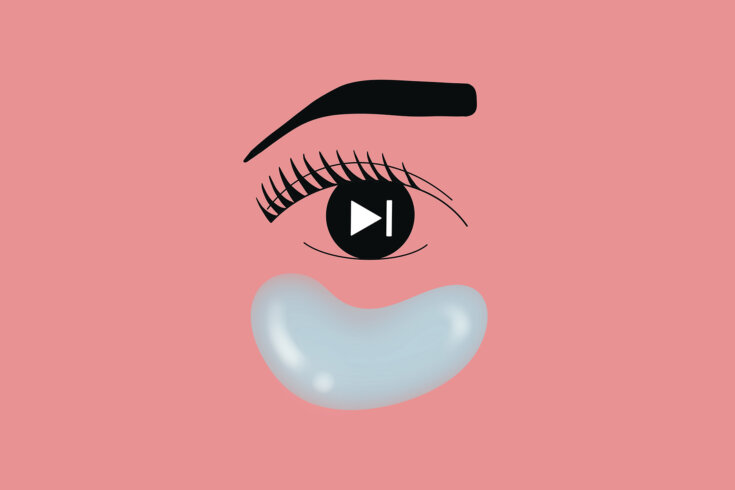
She holds a favourite serum up to the camera and squeezes a pea-sized drop onto the back of her terribly smooth hand. Rubs it into her skin in circular strokes, then sniffs it like she’s taking a hit. All the while enumerating, in a British accent, its many regenerating properties.
I don’t remember when the skinfluencer first showed up on my feed. What made me click on one of her YouTube videos, brought me to her glowing face smiling on my laptop screen. The titles of her videos, straightforward and unassuming, offer no clues to the grip they once held on my soul. I look at the thumbnails now—“Fave Fives: Cleansing Balms,” “Acid Toners Part One,” “How I’m Dealing with My Pigmentation”—and I’m baffled. How did this content consume my life for two years? Become the stuff of obsession?
It started in the fall of 2019. Until then, I still bought the Olay moisturizer with SPF that I’d been using since I was twenty-three. Washed my face when I remembered. Had the odd facial, the odd existential crisis in the mirror. Occasionally, I electrocuted my face with microcurrent. But, at forty-one, I was beginning to feel, shall we say, vulnerable to certain messaging around beauty and youth. Maybe I did a midnight Google search for the best exfoliators. Maybe I went into Sephora and stared a little too longingly at the anti-aging emulsions, my phone probably spying on me.
As the skinfluencers crept into my feed, I couldn’t stop watching: in the hotel after an event, between classes I taught, as a writing break. First, Caroline Hirons, a British skin care YouTuber, whose entire video offerings—mostly beauty product reviews—I devoured within a matter of weeks. Then Gothamista, a New York– and Hong Kong–based skinthusiast with an otherworldly glow who brought audiences into her bathroom as she performed her byzantine morning and evening routines. After burning through those, I discovered the YouTube dermatologists with their professional attire and authoritative smiles. In dizzying terminology, they debunked beauty myths like “skin cycling” or the promise of hyaluronic acid. Elucidated mysterious ingredients like retinol and glycerin. I was transfixed. This is educational content, I told myself, adding product after recommended product to multiple online shopping carts.
I quickly earned Sephora’s top-tier membership status. My skin routine went from two to eight steps. I brought my laptop into the bathroom, the kitchen, my bed, so that the voices were always within earshot, espousing the benefits of squalane oil or snail mucin. I blinked and, somehow, I owned four mists.
It was, in some ways, a magical time. My skin had never been as radiant as it was in those first months of discovery and experimentation. I felt giddy whenever I burned my face with a cultish acid. I looked in the mirror and brimmed stupidly with a new kind of hope. So why did I also feel a darkness humming under the surface of all of this? A shadow falling over me as I watched and shopped and spritzed?
A bookseller once told me that when you buy a book, you’re also buying the idea of time in which to read it. A down payment on an extension of life, a shimmer of immortality. With my growing collection of serums, I was perhaps seeking something similarly existential. An illusion of control. A staving off of death. The promise that I might look in the mirror and always see a self I recognized, a friend.
A few months after my first click, I started writing a novel about a woman whose obsession with skin care takes her down a dangerous rabbit hole, through which she discovers the demons and depths that lurk beneath this pursuit. Now that I’ve gone down that rabbit hole myself, both on the page and all too deeply in the mirror, my dark obsession has also cleared. My skin care routine is back down to two (okay, three) steps.
But I still have far too many mists.







